
George III was King of Great Britain and Ireland from 25 October 1760 until his death in 1820. The Acts of Union 1800 unified Great Britain and Ireland into the United Kingdom of Great Britain and Ireland, with George as its king. He was concurrently Duke and Prince-elector of Hanover in the Holy Roman Empire before becoming King of Hanover on 12 October 1814. He was a monarch of the House of Hanover who, unlike his two predecessors, was born in Great Britain, spoke English as his first language, and never visited Hanover.
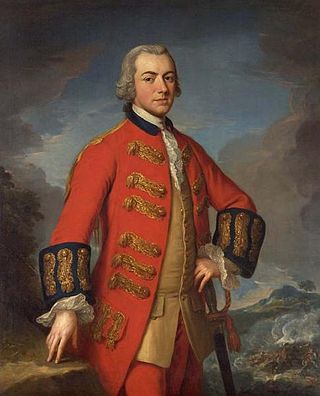
General Sir Henry Clinton, KB was a British Army officer and politician who sat in the House of Commons between 1772 and 1795. He is best known for his service as a general during the American War of Independence. He arrived in Boston in May 1775 and was the British Commander-in-Chief in America from 1778 to 1782. He was a Member of Parliament for many years due to the influence of his cousin Henry Pelham-Clinton, 2nd Duke of Newcastle. Late in life, he was named Governor of Gibraltar, but he died before assuming the post.
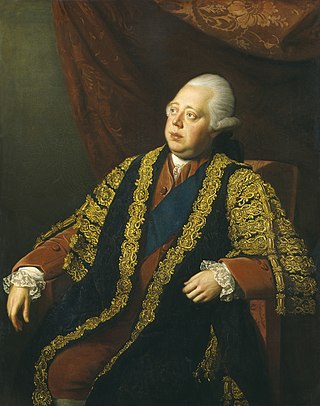
Frederick North, 2nd Earl of Guilford, better known by his courtesy title Lord North, which he used from 1752 to 1790, was Prime Minister of Great Britain from 1770 to 1782. He led Great Britain through most of the American War of Independence. He also held a number of other cabinet posts, including Home Secretary and Chancellor of the Exchequer.

George Germain, 1st Viscount Sackville, PC, styled The Honourable George Sackville until 1720, Lord George Sackville from 1720 to 1770 and Lord George Germain from 1770 to 1782, was a British soldier and politician who served as Secretary of State for the American Department in Lord North's cabinet during the American War of Independence.

Charles Manners-Sutton, 1st Viscount Canterbury, was a British Tory politician who served as Speaker of the House of Commons from 1817 to 1835.
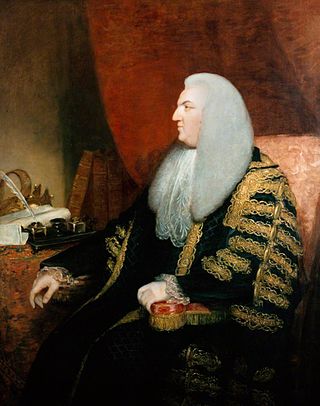
Baron Grantley, of Markenfield, in the County of York is a title in the Peerage of Great Britain. It was created on 9 April 1782 for Sir Fletcher Norton, Attorney General from 1763 to 1765 and Speaker of the House of Commons from 1770 to 1780. His son, the second Baron, was also a politician and represented Richmond, Wigtown Burghs, Guildford and Surrey in Parliament. He was succeeded by his nephew, Fletcher Norton, the third Baron. He was childless and on his death the title passed to his nephew, the fourth Baron. As of 2017 the title is held by the latter's great-great-grandson, the eighth Baron, who succeeded his father in 1995.

John Dunning, 1st Baron Ashburton, of Spitchwick the parish of Widecombe-in-the-Moor, Devon, was an English lawyer and politician, born in Ashburton in Devon, who served as Solicitor-General from 1768. He was first noticed in English politics when he wrote a notice in 1762 defending the British East India Company merchants against their Dutch rivals. He was a member of parliament from 1768 onward. His career in the House of Commons is best known for his motion in 1780 that "the influence of the crown has increased, is increasing, and ought to be diminished". He was created Baron Ashburton in 1782.

Fletcher Norton, 1st Baron Grantley, PC was an English lawyer and politician who sat in the House of Commons from 1756 to 1782 when he was raised to the peerage as Baron Grantley.

Charles Wolfran Cornwall was a British politician who sat in the House of Commons from 1768 to 1789. He was Speaker of the House of Commons from 1780 to 1789.
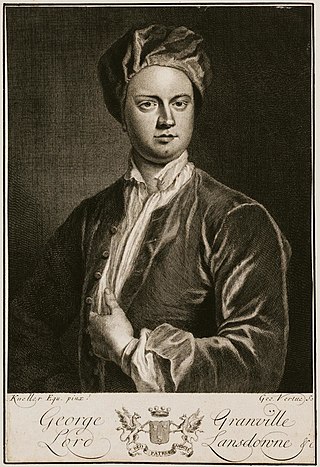
George Granville, 1st Baron Lansdowne PC, of Stowe, Cornwall, was an English Tory politician who sat in the English and British House of Commons from 1702 until 1712, when he was raised to the peerage as Baron Lansdown and sat in the House of Lords. He was Secretary at War during the Harley administration from 1710 to 1712. He was also a noted poet and made a name for himself with verses composed on the visit of Mary of Modena, then Duchess of York, while he was at Cambridge in 1677. He was also a playwright, following in the style of John Dryden.

Sir Henry Rolle (1589–1656), of Shapwick in Somerset, was Chief Justice of the King's Bench and served as MP for Callington, Cornwall, (1614–1623–4) and for Truro, Cornwall (1625–1629).
Henry Powle was an English lawyer and politician who sat in the House of Commons at various times between 1660 and 1690, and was Speaker of the House of Commons from January 1689 to February 1690. He was also Master of the Rolls.

Frederick Montagu was a British Whig MP.
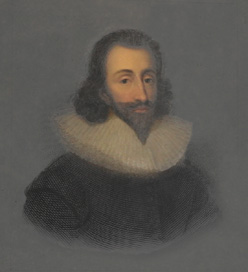
Sir John Eliot was an English statesman who was serially imprisoned in the Tower of London, where he eventually died, by King Charles I for advocating the rights and privileges of Parliament.

Identifying the last native speaker of the Cornish language was a subject of academic interest in the 18th and 19th centuries, and continues to be a subject of interest today. The traditional view that Dolly Pentreath (1692–1777) was the last native speaker of the language has been challenged by records of other candidates for the last native speaker, and additionally there are records of others who had knowledge of the language at a later date, while not being native speakers.

Captain Wolfran Cornewall was an officer in the Royal Navy.

The January 1789 election of the Speaker of the House of Commons occurred on 5 January 1789.
The 1770 election of the Speaker of the House of Commons occurred on 22 January 1770.

The 1833 election of the Speaker of the House of Commons occurred on 29 January 1833.

The 1835 election of the Speaker of the House of Commons occurred on 19 February 1835.

















